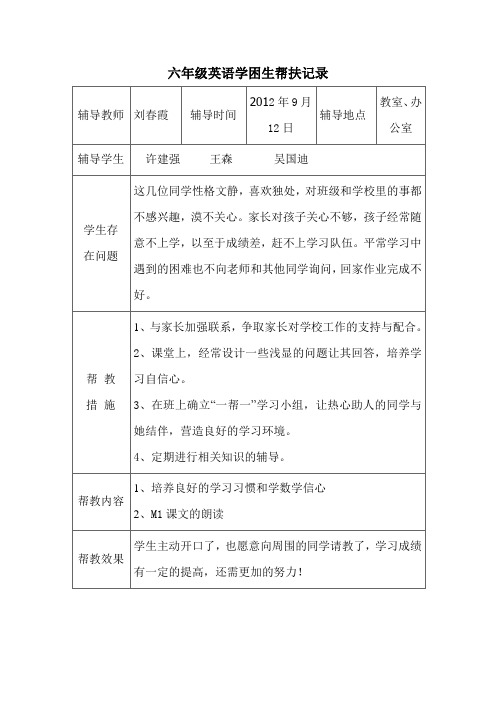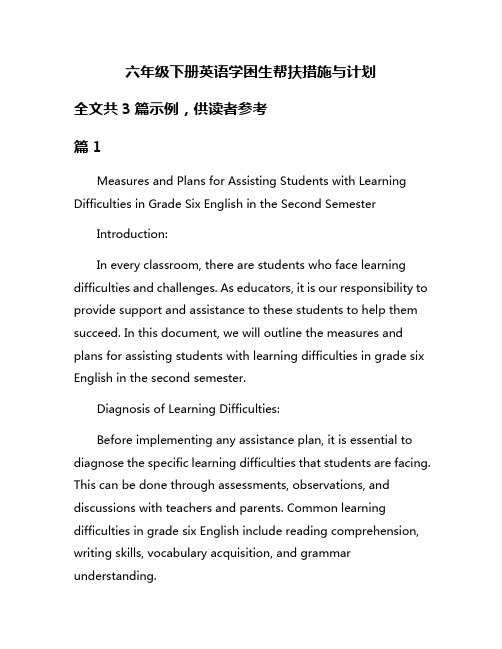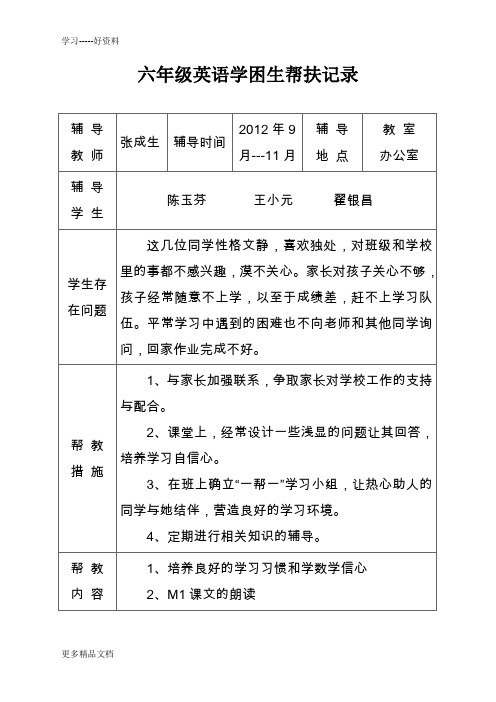六年级英语学困生帮扶记录文本
六年级英语学困生帮扶记录

帮教内容
1、培养良好的学习习惯和学英语的欲望。
2、学过的课文和单词。
帮教效果
有一定的提高,但还需要更加努力。
辅导教师
刘春霞
辅导时间
2012年10月24日
辅导地点
教室
辅导学生
3、课堂教学中多关心他们的学习状态,并注意做到分层次练习,让他们尝试在课堂上完成老师所布置作业。同时,多给予他们回答问题的机会,帮助树立学习自信心;并培养良好的学习习惯,重点是培养按时完成作业的习惯。
帮教内容
1、激发学生的学习兴趣。
2、英语基础知识的辅导
帮教效果
转化效果良好,学生的成绩有了进步,学习的积极性和学习兴趣提高了。
许建强 王森 吴国迪
学生存
在问题
1.说假话、欺骗家长老师同学是家常便饭,张口即来。
2.上课不听讲,课后不写作业或乱抄作业胡应付。
3.不遵守纪律,迟到说话看闲书。
帮教
措施
1、与孩子谈心,增强他学习的积极性和自信心。
2、针对该生实际情况,开展“一帮一活动”为该生找一位负责任的“小老师”,经常对他们进行辅导和帮助。
六年级英语学困生帮扶记录
辅导教师
刘春霞
辅导时间
2012年9月12日
辅导地点
教室、办公室
辅导学生
许建强 王森 吴国迪
学生存
在问题
这几位同学性格文静,喜欢独处,对班级和学校里的事都不感兴趣,漠不关心。家长对孩子关心不够,孩子经常随意不上学,以至于成绩差,赶不上学习队伍。平常学习中遇到的困难也不向老师和其他同学询问,回家作业系,争取家长对学校工作的支持与配合。
六年级下册英语学困生帮扶措施与计划

六年级下册英语学困生帮扶措施与计划全文共3篇示例,供读者参考篇1Measures and Plans for Assisting Students with Learning Difficulties in Grade Six English in the Second SemesterIntroduction:In every classroom, there are students who face learning difficulties and challenges. As educators, it is our responsibility to provide support and assistance to these students to help them succeed. In this document, we will outline the measures and plans for assisting students with learning difficulties in grade six English in the second semester.Diagnosis of Learning Difficulties:Before implementing any assistance plan, it is essential to diagnose the specific learning difficulties that students are facing. This can be done through assessments, observations, and discussions with teachers and parents. Common learning difficulties in grade six English include reading comprehension, writing skills, vocabulary acquisition, and grammar understanding.Assistance Measures:1. Individualized Learning Plans: After diagnosing the learning difficulties of students, individualized learning plans should be created for each student. These plans should outline the specific areas of difficulty, as well as the strategies and resources to support the student in overcoming these challenges. The plans should be reviewed and adjusted regularly based on the progress of the students.2. Small Group Instruction: Students with learning difficulties can benefit from small group instruction, where they receive targeted support and intervention. Teachers can group students based on their learning needs and provide specialized instruction to help them improve their English skills.3. Differentiated Instruction: In a classroom setting, it is essential to provide differentiated instruction to meet the diverse learning needs of students. Teachers can modify the curriculum, teaching methods, and assessments to accommodate the learning difficulties of students and ensure their success.4. Remedial Support: Some students may require extra support outside of the regular classroom instruction. Remedial classes can be conducted before or after school to provide additional assistance to students with learning difficulties. Theseclasses can focus on specific areas of difficulty and provide targeted instruction to help students improve.5. Parent Involvement: Parents play a crucial role in supporting students with learning difficulties. It is essential to keep parents informed about their child's progress, provide them with resources and strategies to help their child at home, and involve them in the decision-making process regarding their child's education.Assistance Plans:1. Weekly Progress Monitoring: Teachers should monitor the progress of students with learning difficulties on a weekly basis. This can be done through assessments, quizzes, and assignments to track the improvement of students and identify areas that need further support.2. Peer Tutoring Program: Peer tutoring can be an effective way to support students with learning difficulties. Students can be paired with a peer who excels in English to receive additional help and guidance. This not only benefits the student receiving assistance but also enhances the learning experience of the peer tutor.3. After-School Homework Club: An after-school homework club can be established for students with learning difficulties to receive additional support with their English assignments. Teachers or volunteers can provide guidance and assistance to students as they work on their homework assignments.4. Summer Enrichment Program: A summer enrichment program can be organized to provide extended support and intervention to students with learning difficulties. The program can focus on building English skills through engaging activities, projects, and exercises to help students improve their language proficiency.Conclusion:Assisting students with learning difficulties requires a collaborative effort involving teachers, parents, and students. By implementing the measures and plans outlined in this document, we can provide the necessary support and assistance to help students overcome their challenges and succeed in grade six English. Let us work together to create a supportive and inclusive learning environment for all students.篇2Measures and Plans to Help Underachieving Students in the Sixth Grade English ClassIntroductionIn every classroom, there are always students who struggle to keep up with their peers academically. These students are often referred to as underachieving or learning disabled students. In the context of the sixth grade English class, it is important for teachers to identify these students early on and provide them with the necessary support to help them improve their performance. In this document, we will outline some measures and plans to assist underachieving students in the sixth grade English class.Identification of Underachieving StudentsThe first step in helping underachieving students is to correctly identify them. This can be done through a variety of methods, including teacher observation, test scores, and feedback from parents. Some common signs that a student may be underachieving in English class include:- Low grades on assignments and tests- Difficulty understanding and completing homework- Lack of participation in class discussions- Poor reading and writing skillsOnce underachieving students have been identified, it is important to develop a personalized plan to help them improve their performance.Personalized Learning PlansOne effective way to help underachieving students in the sixth grade English class is to create personalized learning plans for each student. These plans should take into account the individual needs and strengths of each student, and should include goals, objectives, and strategies to help them achieve success.For example, if a student is struggling with reading comprehension, their personalized learning plan might include extra reading assignments, reading comprehension exercises, and one-on-one tutoring sessions with the teacher. If a student is having difficulty writing essays, their plan might include brainstorming sessions, peer editing exercises, and writing workshops.Intervention StrategiesIn addition to personalized learning plans, there are a variety of intervention strategies that can be used to helpunderachieving students in the sixth grade English class. Some common intervention strategies include:- Small group instruction: Providing targeted instruction to small groups of students who are struggling with a particular concept or skill.- Peer tutoring: Pairing underachieving students with higher-achieving peers to provide them with additional support and guidance.- Extended learning time: Offering before or after-school tutoring sessions for students who need extra help.- Technology-based learning: Using educational technology, such as online learning programs and interactive whiteboards, to engage underachieving students in the learning process.It is important to monitor the progress of underachieving students regularly and adjust intervention strategies as needed.Parent InvolvementParent involvement is also crucial in helping underachieving students succeed in the sixth grade English class. Teachers should communicate regularly with parents about their child's progress and provide them with strategies for supporting their child at home. Parents can also help by creating a supportivelearning environment at home, setting aside time for homework and study, and encouraging their child to read and write outside of school.ConclusionIn conclusion, underachieving students in the sixth grade English class can benefit greatly from personalized learning plans, intervention strategies, and parent involvement. By identifying these students early on, developing targeted plans to help them improve, and involving parents in the learning process, teachers can help underachieving students succeed academically and develop a love for learning. With the right support and guidance, every student has the potential to achieve their full potential in the sixth grade English class.篇3Measures and Plans to Assist and Support Underperforming Students in Sixth Grade EnglishIntroduction:The sixth grade is a critical stage in a student's academic journey, as it lays the foundation for their future learning and success. However, some students may struggle with English language learning, leading to poor performance and a lack ofmotivation. In order to support and assist these underperforming students, it is important to implement specific measures and plans tailored to their needs.Measures:1. Individualized Learning Plans:Each underperforming student will have an individualized learning plan that outlines their specific strengths, weaknesses, and learning goals. This plan will include targeted interventions and strategies to help the student improve their English skills and academic performance.2. Small Group Tutoring:Underperforming students will be grouped together for small group tutoring sessions with a qualified English teacher. These sessions will focus on reinforcing key language skills, providing additional practice, and addressing any misconceptions or difficulties the students may have.3. Peer Mentoring:Stronger students in the class will be assigned as peer mentors to underperforming students. Peer mentors will provide academic support, guidance, and encouragement to help their peers improve their English skills and boost their confidence.4. Regular Progress Monitoring:Progress monitoring assessments will be conducted regularly to track the academic progress of underperforming students. These assessments will help identify areas of improvement and guide instructional interventions.5. Parental Involvement:Parents will be actively involved in their child's English learning journey. They will receive regular updates on their child's progress, participate in parent-teacher meetings, and be encouraged to support their child's learning at home.Plans:1. Weekly Check-ins:Each underperforming student will have a weekly check-in with their English teacher to discuss their progress, challenges, and goals. These check-ins will provide an opportunity for students to receive feedback, set learning targets, and seek assistance when needed.2. Extended Learning Opportunities:Underperforming students will have access to extended learning opportunities, such as online resources, educationalgames, and language enrichment activities. These opportunities will help reinforce classroom learning and provide additional practice.3. Enrichment Workshops:Enrichment workshops will be organized for underperforming students to enhance their English skills and knowledge. These workshops will cover topics such as grammar, vocabulary, reading comprehension, and writing skills.4. Rewards and Incentives:To motivate underperforming students, rewards and incentives will be provided for achieving learning milestones, making progress, and demonstrating effort. These rewards can include certificates, praise, small prizes, and recognition in front of their peers.5. Collaborative Learning:Underperforming students will be encouraged to participate in collaborative learning activities, group projects, and peer discussions. These activities will help students develop teamwork skills, enhance their communication abilities, and build confidence in using English.Conclusion:By implementing targeted measures and plans to assist and support underperforming students in sixth grade English, we can help them overcome challenges, improve their skills, and achieve academic success. With the collective efforts of teachers, parents, and peers, every student can reach their full potential and thrive in their English language learning journey. Let's work together to empower and uplift all students, regardless of their starting point.。
六年级英语学困生帮扶记录

内容
1、培养良好的学习习惯和学英语信心
2、相关英语知识的辅导
帮教
措施
1、走近他,发现其闪光点,促其上进。
2、经常和他谈话,或下课时,或游戏中,让其中多一点信任,多几份理解,少一些责难。
3、激活其乐学点。我经常将其找来谈心,给他补习功课,多数利用下午放学时间帮助他学习。
学困生辅导记录
辅导
教师
辅导
时间
帮教
内容
1、激发学生的学习兴趣。
2、英语基础知识的辅导
帮教
效果
转化效果良好,学生的成绩有了进步,学习的积极性和学习兴趣提高了。
学困生辅导记录
辅导
教师
辅导
时间
辅导
地点
办公室
辅导
学生
学生存
在问题
该同学学习成绩较差,平时考试的情况令人担忧,书写速度快,但是快中不能求好,字迹马虎,认字、写字的情况比较糟糕,但是该生性格随和,平时总能按时按量完成作业,上课也能比较认真的听讲,爱劳动,成绩虽不太好,但是许多同学都乐于和他交往
学生存
在问题
1.说假话、欺骗家长老师同学是家常便饭,张口即来。
2.上课不听讲,课后不写作业或乱抄作业胡应付。
3.不遵守纪律,迟到说话看闲书。
帮教
措施
1、与孩子谈心,增强他学习的积极性和自信心。
2、针对该生实际情况,开展“一帮一活动”为该生找一位负责任的“小老师”,经常对他们进行辅导和帮助。
3、课堂教学中多关心他们的学习状态,并注意做到分层次练习,让他们尝试在课堂上完成老师所布置作业。同时,多给予他们回答问题的机会,帮助树立学习自信心;并培养良好的学习习惯,重点是培养按时完成作业的习惯。
辅导
小学英语学困生帮扶计划 六年级

小学英语学困生帮扶计划英语学习有困难的学生,在同等教育中,英语学习水平较低,达不到国家规定的相应英语教学大纲要求的学生。
他们当中有些是英语能力的问题,指那些比其他学生要花费更多的时间和精力才能勉强掌握英语知识和技能的学生;有些是因有其他问题,例如,学习英语的环境、动力以及兴趣、信心等心理问题;另外还有英语的基础不扎实等知识积累问题。
英语学习中的学习困难学生,主要有以下表现特征:1.对口语交际说不清其来龙去脉,只能照搬硬套,不能灵活应用,稍作变化则不知其然。
2.听课时缺乏主动思考,往往只是注意结论,不深究其形成过程,遇到困难消极等待。
3.自学时,找不出问题的重点和难点,不能整理出教材所叙述的内容,提不出问题,看书时注意力不集中。
4.做作业时,不按题目的意思,不懂装懂,转化能力较差。
针对这么多的原因分析,我们应该如何去解决呢?1.我们应在平时上课中,有意强化英语学困生对英语的敏锐感,多引导他们对英语现象的观察和思考。
如多做一些有趣味性的英语题目,多做一些带有图形图象的直观性题目。
2.故事、游戏、现实生活场景都是学生最容易接受的学习方式。
通过有趣的喜闻乐见的场景引入课题,可以牢牢地吸引他们的注意力,学生仿佛自己进入了故事情景中,不由自主地产生了强烈的探究3.以合作交流促思维合作学习不但可以培养学生团结合作、沟通与交流的能力,而且有利于激发和促进学生思维的发展,特别是学困生思维的发展。
这样使他们得到了帮助,能力也得到了提高。
4.培养英语学困生的学习兴趣培养学生对英语学科的兴趣,感受和欣赏英语学科的魅力,形成自觉学习和追求新知识的倾向是转化学生英语学习困难的策略之一。
只有当学生通过自己的努力获得了进步,掌握了一定的英语方法,才能感受成功的快乐。
我们在英语教学中,首要问题就是激发学生学习英语的兴趣。
培养学生英语学习兴趣的途径很多,主要来说,可以考虑以下几点。
(1)降低学习要求英语困难生基础差、思维能力弱,因此教师在讲课时要注意从简入手。
英语辅导学生记录 情况分析

第一篇:英语课外辅导学生记录英语课外辅导学生记录学困生姓名:刘孟宇、邓志浩、周梦凯、张玉钦、王若天、刘迎辉造成学习困难的原因:在这几个学困生当中,只有一个学生态度比较认真,作业也能按时完成。
但由于智力发展因素,他们的基础较差,反应较慢,接受新知识的能力也较慢。
而另一部分学生学习习惯较差,缺少学习的主动性与自觉性,从而渐渐养成不做作业的坏习惯。
现状分析:由于他们的基础较差,学习习惯较差,反应较慢,接受新知识的能力也较慢。
单词记忆一塌糊涂。
往往强记了几个,第二天又忘了。
辅导过程:由于上课强调的重点、难点他们不一顶听得进去,而且大容量无疑是增加他们的心理负担和反感,所以我利用时间主要是进行精简重点,降低要求,细化难点,多做记忆练习。
今天辅导的内容是Unit2,我从单词、重点句型入手。
首先我给1 0分钟时间进行记忆,并要求学生记忆的时候要眼、脑、手、口并用,调动多种感官强化记忆。
在四会单词中我又挑出重点,分批记忆。
不一会儿,我看见韦钦和蒋琦已经在摩拳擦掌了。
于是,我让他们两先默写。
在默写的过程中,我发现他们有时下笔如有神,有时似碰运气。
于是默写完后我面批,并询问他们记忆单词的方法。
通过时间不难发现,自己掌握一点以及单词的巧妙方法能使单词长时间记住不忘。
于是我鼓励他们多寻找属于自己的记忆方法,避免死记硬背。
讨论后并进行交流。
如“blackboard”是“black”黑色加“board”,“eight”只要将学过的“right”中的“r”变成“e”。
在记忆过程中边思考边拼读记忆,效果显而易见。
回家作业,默写第2单元单词,第二天检查。
第二篇:英语课外辅导总结2015-2016英语课外辅导总结课外辅导是适应学生个别差异、因材施教的一个重要措施。
它是上课的一种补充形式,但不是上课教育的继续。
课外辅导可以分为个别辅导和集体辅导两种形式,我这里是以个别辅导为主。
其主要任务是析疑释难,指导学生自学钻研,补差与培尖,尤其是对那些知识技能上有缺陷的学生,我在课外采取一定的矫正措施,使他们及时弥补缺陷,为以后继续学习打下扎实的基础。
学困生帮扶记录范文

学困生帮扶记录范文日期:20XX年XX月XX日学生姓名:XXX学号:XXX年级:XXX【问题描述】学生XXX是我们班的学困生之一,他在学习方面存在以下问题:1.学习态度不端正,经常上课走神,不积极参与课堂讨论;2.严重缺乏学习方法,不会合理安排学习时间,不懂得如何有效地记笔记和复习;3.学习成绩在班级中偏低,尤其是数学和英语方面表现较差。
【帮扶措施】1.心理疏导:与学生XXX进行一对一谈话,了解其学习情况以及问题所在,并积极传递正能量,增强学生的自信心与学习动力;2.学习方法指导:与学生XXX详细介绍了一些常用的学习方法,如备课笔记的正确方式和专注力培养等,帮助学生建立正确的学习方法;3.辅导课程安排:安排学生参加专门的辅导课程,帮助其解决数学和英语学习方面的问题;4.班级集体帮扶:动员班级其他同学关心帮助学生XXX,提供学习上的支持和鼓励。
一段时间的帮扶后,学生XXX在学习方面取得了积极的变化:1.学习态度转变:学生XXX的学习态度逐渐端正,上课时专注听讲,积极参与课堂,表现出浓厚的学习兴趣;2.学习方法改进:学生XXX开始尝试按照老师指导使用正确的学习方法,记笔记更加有条理,复习计划合理安排;3.成绩提升:学生XXX的学习成绩有了明显的提升,尤其是在数学和英语方面有了较大的进步,获得了班级内的表扬。
【问题描述】学生XXX是我们班级的学困生之一,他在学习方面存在以下问题:1.学习动力不足,对学习缺乏兴趣,经常心不在焉;2.学习态度消极,经常迟到早退,作业完成质量低;3.缺乏自学能力,遇到难题容易崩溃,对解决问题缺乏耐心和毅力。
【帮扶措施】1.规范管理:与学生XXX进行正式约谈,明确学习时间和作业要求,建立学生的规范学习习惯;2.引导学习兴趣:通过了解学生的兴趣爱好,指导学生将学习与兴趣结合,提高学习的主动性和积极性;3.培养自学能力:针对学生XXX缺乏自学能力的问题,教授学生一些学习方法和思考问题的方式,引导学生独立思考并解决问题;经过一段时间的帮扶后,学生XXX在学习方面取得了明显的进步:1.学习动力提升:学生XXX的学习动力明显增强,课堂上专心听讲,主动参与讨论,作业完成质量显著提高;2.学习态度改善:学生XXX的学习态度变得积极向上,不再迟到早退,课堂纪律问题得到较好的解决;3.自学能力增强:经过帮扶,学生XXX的自学能力得到了较大的提升,遇到难题时能够冷静面对,寻求解决方法,并渐渐养成了持之以恒的毅力。
[小学]六年级英语学困生帮扶记录
![[小学]六年级英语学困生帮扶记录](https://img.taocdn.com/s3/m/42253bf1d1f34693dbef3e23.png)
[小学]六年级英语学困生帮扶记录六年级英语学困生帮扶记录辅导 2012年9辅导教室张成生辅导时间教师月---11月地点办公室辅导陈玉芬王小元翟银昌学生这几位同学性格文静~喜欢独处~对班级和学校里的事都不感兴趣~漠不关心。
家长对孩子关心不够~学生存孩子经常随意不上学~以至于成绩差~赶不上学习队在问题伍。
平常学习中遇到的困难也不向老师和其他同学询问~回家作业完成不好。
1、与家长加强联系~争取家长对学校工作的支持与配合。
2、课堂上~经常设计一些浅显的问题让其回答~帮教培养学习自信心。
措施3、在班上确立“一帮一”学习小组~让热心助人的同学与她结伴~营造良好的学习环境。
4、定期进行相关知识的辅导。
帮教 1、培养良好的学习习惯和学数学信心内容 2、M1课文的朗读帮教学生主动开口了~也愿意向周围的同学请教了~效果学习成绩有一定的提高~还需更加的努力:六年级语文学困生帮扶记录辅导 2012年10辅导刘永忠辅导时间办公室教师月---12月地点辅导李兆鹏秦小慧翟晓琴学生学生存学生的学习态度不好~不能主动的学习~经常不在问题写作业。
~课文不会朗读~从不回答问题。
1、走近他们~发现其闪光点~促其上进。
2、经常和他们谈话~或下课时~或游戏中~让其中多一点信任~多几份理解~少一些责难~少一点帮教怨恨~多几份关爱~让他们体会到老师对他的期望和措施关心。
3、激活其乐学点。
我经常将其找来谈心~给他们补习功课~多数利用下午课外活动时间帮助他学习。
平时我加倍地关心他们~安排好同学帮助他们。
帮教 1、培养良好的学习习惯和学语文的欲望。
内容 2、学过的课文和字、词、句。
帮教有一定的提高~但还需要更加努力。
效果六年级英语学困生帮扶记录辅导 2012年3辅导刘春霞辅导时间教室教师月---4月地点辅导田东年李景怡王琴学生1.说假话、欺骗家长老师同学是家常便饭~张口即来。
学生存2.上课不听讲~课后不写作业或乱抄作业胡应付。
在问题3.不遵守纪律~迟到说话看闲书。
六年级英语学困生帮扶记录汇编

内容
1、培养良好的学习习惯和学数学信心
2、相关数学知识的辅导
帮教
措施
1、走近他,发现其闪光点,促其上进。
2、经常和他谈话,或下课时,或游戏中,让其中多一点信任,多几份理解,少一些责难。
3、激活其乐学点。我经常将其找来谈心,给他补习功课,多数利用下午放学时间帮助他学习。
学困生辅导记录
辅导
教师
刘永忠
帮教
措施
1、与家长加强联系,争取家长对学校工作的支持与配合。
2、课堂上,经常设计一些浅显的问题让其回答,培养学习自信心。
3、在班上确立“一帮一”学习小组,让热心助人的同学与她结伴,营造良好的学习环境。
4、定期进行相关知识的辅导。
帮教
内容
1、培养良好的学习习惯和学数学信心
2、M1课文的朗读
帮教
效果
学生主动开口了,也愿意向周围的同学请教了,学习成绩有一定的提高,还需更加的努力!
辅导
功能性手工艺品。不同的玉石具有不同的功效,比如石榴石可以促进血液循环,改善风湿和关节炎;白水晶则可以增强记忆力;茶晶能够帮助镇定情绪,缓解失眠、头昏等症状。顾客可以根据自己的需要和喜好自行搭配,每一件都独一无二、与众不同。地点
标题:大学生“负债消费“成潮流2004年3月18日教室
辅导
学生
田东年李景怡王琴
学生存
在问题
1.说假话、欺骗家长老师同学是家常便饭,张口即来。
2.上课不听讲,课后不写作业或乱抄作业胡应付。
3.不遵守纪律,迟到说话看闲书。
帮教
措施
1、与孩子谈心,增强他学习的积极性和自信心。
2、针对该生实际情况,开展“一帮一活动”为该生找一位负责任的“小老师”,经常对他们进行辅导和帮助。
- 1、下载文档前请自行甄别文档内容的完整性,平台不提供额外的编辑、内容补充、找答案等附加服务。
- 2、"仅部分预览"的文档,不可在线预览部分如存在完整性等问题,可反馈申请退款(可完整预览的文档不适用该条件!)。
- 3、如文档侵犯您的权益,请联系客服反馈,我们会尽快为您处理(人工客服工作时间:9:00-18:30)。
辅导
教师
成生
辅导时间
2012年9月---11月
辅导
地点
教室
办公室
辅导
学生
玉芬王小元翟银昌
学生存
在问题
这几位同学性格文静,喜欢独处,对班级和学校里的事都不感兴趣,漠不关心。家长对孩子关心不够,孩子经常随意不上学,以至于成绩差,赶不上学习队伍。平常学习中遇到的困难也不向老师和其他同学询问,回家作业完成不好。
永忠
辅 导
时 间
2011年09--10月
辅 导
地 点
办公室
辅 导
学 生
金年
学生存
在问题
金年同学学习成绩较差,平时考试的情况令人担忧,书写速度快,但是快中不能求好,字迹马虎,认字、写字的情况比较糟糕,但是该生性格随和,平时总能按时按量完成作业,上课也能比较认真的听讲,爱劳动,成绩虽不太好,但是许多同学都乐于和他交往
帮 教
措 施
1、与家长加强联系,争取家长对学校工作的支持与配合。
2、课堂上,经常设计一些浅显的问题让其回答,培养学习自信心。
3、在班上确立“一帮一”学习小组,让热心助人的同学与她结伴,营造良好的学习环境。
4、定期进行相关知识的辅导。
帮教
容
1、培养良好的学习习惯和学数学信心
2、M1课文的朗读
帮教
效果
学生主动开口了,也愿意向周围的同学请教了,学习成绩有一定的提高,还需更加的努力!
学困生辅导记录
辅 导
教 师
永忠
辅 导
时 间
2012、03、04、
辅 导
地 点
办公室
辅 导
学 生
田 苗
学生存
在问题
田 苗同学学习成绩较差,平时考试的情况令人担忧,书写速度快,但是快中不能求好,字迹马虎,认字、写字的情况比较糟糕,但是该生性格随和,平时总能按时按量完成作业,上课也能比较认真的听讲,爱劳动,成绩虽不太好,但是许多同学都乐于和他交往
六年级语文学困生帮扶记录
辅导
教师
永忠
辅导时间
2012年10月---12月
辅导
地点
办公室
辅导
学生
兆鹏 小慧 翟晓琴
学生存
在问题
学生的学习态度不好,不能主动的学习,经常不写作业。,课文不会朗读,从不回答问题。
帮 教
措 施
1、走近他们,发现其闪光点,促其上进。
2、经常和他们谈话,或下课时,或游戏中,让其中多一点信任,多几份理解,少一些责难,少一点怨恨,多几份关爱,让他们体会到老师对他的期望和关心。
3、激活其乐学点。我经常将其找来谈心,给他们补习功课,多数利用下午课外活动时间帮助他学习。平时我加倍地关心他们,安排好同学帮助他们。
帮教
容
1、培养良好的学习习惯和学语文的欲望。
2、学过的课文和字、词、句。
帮教
效果
有一定的提高,但还需要更加努力。
六年级英语学困生帮扶记录
辅导
教师
春霞
辅导时间
2012年3月---4月
帮 教
容
1、培养良好的学习习惯和学数学信心
2、相关数学知识的辅导
帮 教
措 施
1、走近他,发现其闪光点,促其上进。
2、经常和他谈话,或下课时,或游戏中,让其中多一点信任,多几份理解,少一些责难。
3、激活其乐学点。我经常将其找来谈心,给他补习功课,多数利用下午放学时间帮助他学习。
3、课堂教学中多关心他们的学习状态,并注意做到分层次练习,让他们尝试在课堂上完成老师所布置作业。同时,多给予他们回答问题的机会,帮助树立学习自信心;并培养良好的学习习惯,重点是培养按时完成作业的习惯。
帮教
容
1、激发学生的学习兴趣。
2、英语基础知识的辅导
帮教
效果
转化效果良好,学生的成绩有了进步,学习的积极性和学习兴趣提高了。
辅导
地点
教室
辅导
学生
田东年 景怡 王琴
学生存
在问题
1.说假话、欺骗家长老师同学是家常便饭,口即来。
2.上课不听讲,课后不写作业或乱抄作业胡应付。
3.不遵守纪律,迟到说话看闲书。
帮 教
措 施
1、与孩子谈心,增强他学习的积极性和自信心。
2、针对该生实际情况,开展“一帮一活动 ”为该生找一位负责任的“小老师”,经常对他们进行辅导和帮助。
帮 教
容
1、培养良好的学习习惯和学数学信心
2、相关数学知识的辅导
帮 教
下课时,或游戏中,让其中多一点信任,多几份理解,少一些责难。
3、激活其乐学点。我经常将其找来谈心,给他补习功课,多数利用下午放学时间帮助他学习。
学困生辅导记录
辅 导
教 师
